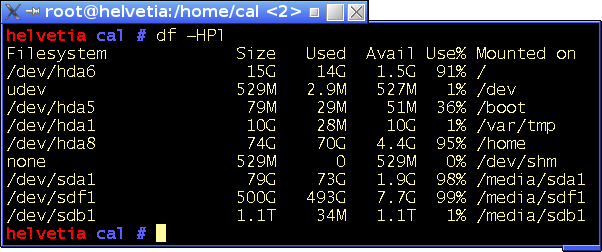Western Digital "MyBook Pro Edition II" 1 TB & linux
Who doesn't know the enldess tale. The day all your drives are filled up arrives sooner than you expect (or rhater: sooner you want it to happen). Today, my recently ordered new external "storrage device" has arrived. This is the storry of runnig it under linux.
Short after unpacking it revealed its fisrt two major drawbacks:
- It's got not a metal case. And I like metal cases.
- It doesn't run under linux out of the box.
So quick, let's run a google search for it (well, for the second one). The first problem probably won't be solvable without handcrafting. I quickly found some people having the same problem, but no solution (again, for the second one). But that's what I expected, here's what to do.
Getting it to run on linux
The cube has a built in, configurable RAID controller and is built for MACs (but runs on Windows, too). So don't start crying if it's not yet necessary. First I grabbed one of the seldom Windows boxes from my office (no Windows at home, but not dark at all) and installed the magic RAID controller utility shipped with the drive. One time "reconfiguring" it to "NTFS / RAID1" made it and the device showed up with 500G after pluggin it to the linux box. A second reconfiguration (on Windows) to "NTFS / RAID0" and it showed the up in its full majesty:

The rest is business as usual. Partition it, format it or do whatever you like with it. The xfs filesystem seems to be designed for more expensive SCSI disks which have different failure characteristics (at least for power-off failures) and an xfs fsck cosumes about a Meg of RAM for every Gig of drive space (this is to be considered when setting up a partition of 1TB size). In the end xfs crashes/repairs (I had three of them, notably due to bad external USB drives) tend to end up in a total mess on the disk. So I chose - let's not make the same mistake twice, look for a new ones - reiserfs3 for this time. This is what it looked like after mountig it:

And because I wanted to *really* have the Terabyte-feeling, the same with sizes by the power of ten:

Testing it
Of course I wanted to know what its basic capabilites are. So I did a quick test
(The system was a 2.6.17-gentoo-r4 #1 PREEMPT on a Dell
Latitude D800 via USB2 connected over a no-name USB HUB):

Running it
Up to now I can't tell much since I just got it new. However one thing I recognised by now is its sometimes *very* noisy fan, spooling up.
So, enough talking for now, let's go and make a backup :-)

